Health & Hygiene: HIV/AIDS
Idea
Target
Constitution
Challenges
Achievements
Outlook
GBS activities carried out in the field of health and hygiene aim at preventing HIV/AIDS, improving reproductive and sexual health, treating STDs/RTIs, organizing specific programme on events like World AIDS Day etc.
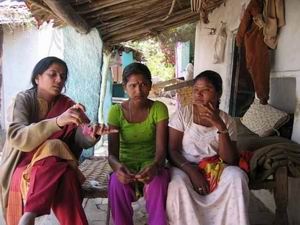
The idea behind more than one decade of interfering in sex work settings by Gram Bharati Samiti (GBS) is to reduce risk of HIV infection among sex workers, their clients and the general population in Rajasthan. By means of culturally appropriate HIV/AIDS interventions for these target audiences information necessary to initiate the process of sexual behaviour change should be conveyed.
GBS aims at improving the quality of life for women selling sex in rural villages - so called sex centers - in order to reduce their risk of infection with HIV and other sexually transmitted diseases (STDs). GBS seeks to achieve this by addressing the primary needs of the sex worker and their community such as land rights and access to safe drinking water, electricity, health care, and basic education for their children.
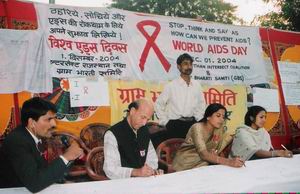
Target area: GBS was the first and foremost NGO to work on HIV/AIDS in Rajasthan. It initiated its work in 1991 by carrying out a baseline survey in 10 districts of the state and interviewing 4000 tribal sex workers in 110 rural villages. Later on GBS focussed its programs in 3 different districts eg. Jaipur, Ajmer and Tonk. It covered 45 villages in these districts taking 5 villages up initially which was continued till the recent past.All the villages GBS worked in so far are situated in the remote quite away from the national highways or main roads. They are not connected with link roads, some of them are still deprived of source of potable water and electricity. There is no medical or health facility, education for the children etc. in and around the area.
 Target population: The target populations for the programs are the women of the Rajnat and Kanzer tribes traditionally involved in sex work. Whereas the Rajnats, who used to entertain the royal families on the occasions of weddings, new born, festivals etc. and got food grains and clothes in lieu of that and thus by the end of the feudalism became quite support-less, the Kanzers has been a nomadic community, only depending on hunting and forest products, never getting accustomed with the habit of cultivation. When the forests declined they were constrained to wander around in search of shelter, water and food. Since both communities neither have got any land to cultivate nor any choice for other alternative jobs, the women of the family entered into commercial sex and they are there till today.
Target population: The target populations for the programs are the women of the Rajnat and Kanzer tribes traditionally involved in sex work. Whereas the Rajnats, who used to entertain the royal families on the occasions of weddings, new born, festivals etc. and got food grains and clothes in lieu of that and thus by the end of the feudalism became quite support-less, the Kanzers has been a nomadic community, only depending on hunting and forest products, never getting accustomed with the habit of cultivation. When the forests declined they were constrained to wander around in search of shelter, water and food. Since both communities neither have got any land to cultivate nor any choice for other alternative jobs, the women of the family entered into commercial sex and they are there till today.
The rate of infection with HIV and other STDs is increasing swiftly among the women involved in sex work due to the considerably low level of education and awareness about the disease among the tribal women and the negligible use of condom among most of the clients. A further problem is the availability of condoms in the area.
 Clients: Truck drivers, tourists, crazy youth of neighboring villages, workers of hotels and shops etc. are among the clients of the sex workers. Generally the clients don't like to use condoms and offer more money to have sex without condom. If a sex worker insts on it, she will lose the client and most of them can't afford this and thus they have to agree on unsafe sex. Therefore the rate of HIV infection among the sex workers has been increasing very fast.
[return to top]
Clients: Truck drivers, tourists, crazy youth of neighboring villages, workers of hotels and shops etc. are among the clients of the sex workers. Generally the clients don't like to use condoms and offer more money to have sex without condom. If a sex worker insts on it, she will lose the client and most of them can't afford this and thus they have to agree on unsafe sex. Therefore the rate of HIV infection among the sex workers has been increasing very fast.
[return to top]
Based on the conducted survey training camps were designed providing the sex centers with educational activities to raise awareness among the sex workers and clients. As consultative body for these camps GBS identified and trained so called peer educators among the sex workers, who had already a leading role in the communities and thus served as extremly helpful in promoting the camps and establishing the credibility of GBS.
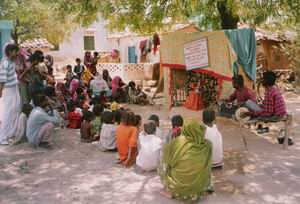 As for the training camps the major elements are:
As for the training camps the major elements are:
- Puppet Shows
Since long traditional puppeteers have been playing a key role in communicating messages. In a project arranged by GBS teams of traditional puppeteers would be identified and trained on the specific themes of project objectives.
 Video Film Shows:
Videos are an important source of entertainment and communication for the women. Also because they all are illiterate they can receive the message by seeing the movie or the puppet shows.
Video Film Shows:
Videos are an important source of entertainment and communication for the women. Also because they all are illiterate they can receive the message by seeing the movie or the puppet shows.
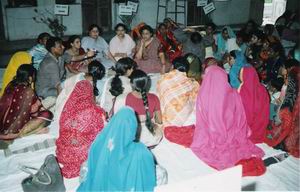 Group discussions:
Small group discussions were organized to raise the level of their awareness and education on HIV/AIDS.
Group discussions:
Small group discussions were organized to raise the level of their awareness and education on HIV/AIDS.
- Condom Distribution: GBS distributed condoms and trained the sex workers on right condom use. Also they provided mobile health services.
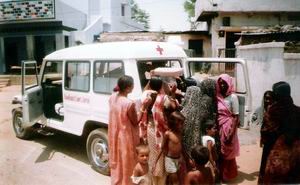
In a further step GBS is providing medical and health services by sending an Outreach Medical Unit on a regular base to the sex centers for general ailments as well as STDs . Further aims are to establish dialogues between sex centers and communities of neighbouring villages in order to develop harmonius relations and reduce the social stigma as well as advocacy with various ministries of the government of Rajasthan to provide the community people with basic amenities.
[return to top]

In the course of the project GBS had to face challenges such as prostitution is engrained as a traditional way of life through generations among many of the tribes. Since sex centers had been isolated and marginalised for many years GBS had to go to great lenghts to establish trust. Moreover, due to the lack of education and low litearcy rates among the sex workers information materials must not depend on text or be too complicatd. The location in remote areas and the underdevelopment of the sex centers imply difficulties of acces in general as well as in terms of health services, primary education, electricity and drinking water. Moreover, condom availablity is scarce and the poor economic situation of the sex workers often forces them to agree on sex without condom as they cannot afford the loss of business.
[return to top]
GBS achieved in the last 15 years already some great results:

- Entering the sex centers for outsiders despite the social stigma of the sex workers was made possible and thus an open society was created in the centers.
- Highly increasing condom use due to training the sex workers on HIV/AIDS awareness and other STDs/ RTIs.
- Providing basic amenities as education for the children and building some hand pumps in different sex centers for safe drinking water.
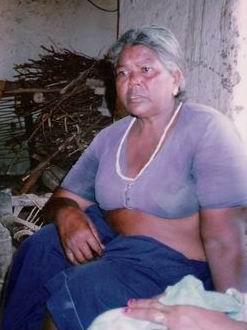
- Training the women on the importance of health seeking behavior and improving the quality of life of tribal women involved in sex work.
- Raising self esteem among the sex workers and empower them in order to resist their exploitation and protect their human rights.
- Reducing likelihood of teenage girls from early induction into sex work.
- Enlisting the sex workers onto the voters list and providing them with cards for the fair price shops owned by the government.
[return to top]
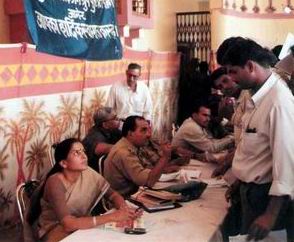 Having worked for over 15 years on HIV/AIDS in Rajasthan, and covering meanwhile 45 villages GBS realized that there are changes, but there is also still a lot of work to do. The sex work is part of the culture of the women and to take them out of the vicious circle it will take a lot of time. For the future the main objective will be to continue the improval of the quality of life for the sex workers especially in provididing them with health care and condom availabiliy as well as basic education for their children.
[return to top]
Having worked for over 15 years on HIV/AIDS in Rajasthan, and covering meanwhile 45 villages GBS realized that there are changes, but there is also still a lot of work to do. The sex work is part of the culture of the women and to take them out of the vicious circle it will take a lot of time. For the future the main objective will be to continue the improval of the quality of life for the sex workers especially in provididing them with health care and condom availabiliy as well as basic education for their children.
[return to top]
 Target population: The target populations for the programs are the women of the Rajnat and Kanzer tribes traditionally involved in sex work. Whereas the Rajnats, who used to entertain the royal families on the occasions of weddings, new born, festivals etc. and got food grains and clothes in lieu of that and thus by the end of the feudalism became quite support-less, the Kanzers has been a nomadic community, only depending on hunting and forest products, never getting accustomed with the habit of cultivation. When the forests declined they were constrained to wander around in search of shelter, water and food. Since both communities neither have got any land to cultivate nor any choice for other alternative jobs, the women of the family entered into commercial sex and they are there till today.
Target population: The target populations for the programs are the women of the Rajnat and Kanzer tribes traditionally involved in sex work. Whereas the Rajnats, who used to entertain the royal families on the occasions of weddings, new born, festivals etc. and got food grains and clothes in lieu of that and thus by the end of the feudalism became quite support-less, the Kanzers has been a nomadic community, only depending on hunting and forest products, never getting accustomed with the habit of cultivation. When the forests declined they were constrained to wander around in search of shelter, water and food. Since both communities neither have got any land to cultivate nor any choice for other alternative jobs, the women of the family entered into commercial sex and they are there till today.
 Clients: Truck drivers, tourists, crazy youth of neighboring villages, workers of hotels and shops etc. are among the clients of the sex workers. Generally the clients don't like to use condoms and offer more money to have sex without condom. If a sex worker insts on it, she will lose the client and most of them can't afford this and thus they have to agree on unsafe sex. Therefore the rate of HIV infection among the sex workers has been increasing very fast.
[return to top]
Clients: Truck drivers, tourists, crazy youth of neighboring villages, workers of hotels and shops etc. are among the clients of the sex workers. Generally the clients don't like to use condoms and offer more money to have sex without condom. If a sex worker insts on it, she will lose the client and most of them can't afford this and thus they have to agree on unsafe sex. Therefore the rate of HIV infection among the sex workers has been increasing very fast.
[return to top]


 As for the training camps the major elements are:
As for the training camps the major elements are:
 Video Film Shows:
Videos are an important source of entertainment and communication for the women. Also because they all are illiterate they can receive the message by seeing the movie or the puppet shows.
Video Film Shows:
Videos are an important source of entertainment and communication for the women. Also because they all are illiterate they can receive the message by seeing the movie or the puppet shows. Group discussions:
Small group discussions were organized to raise the level of their awareness and education on HIV/AIDS.
Group discussions:
Small group discussions were organized to raise the level of their awareness and education on HIV/AIDS.



 Having worked for over 15 years on HIV/AIDS in Rajasthan, and covering meanwhile 45 villages GBS realized that there are changes, but there is also still a lot of work to do. The sex work is part of the culture of the women and to take them out of the vicious circle it will take a lot of time. For the future the main objective will be to continue the improval of the quality of life for the sex workers especially in provididing them with health care and condom availabiliy as well as basic education for their children.
Having worked for over 15 years on HIV/AIDS in Rajasthan, and covering meanwhile 45 villages GBS realized that there are changes, but there is also still a lot of work to do. The sex work is part of the culture of the women and to take them out of the vicious circle it will take a lot of time. For the future the main objective will be to continue the improval of the quality of life for the sex workers especially in provididing them with health care and condom availabiliy as well as basic education for their children.